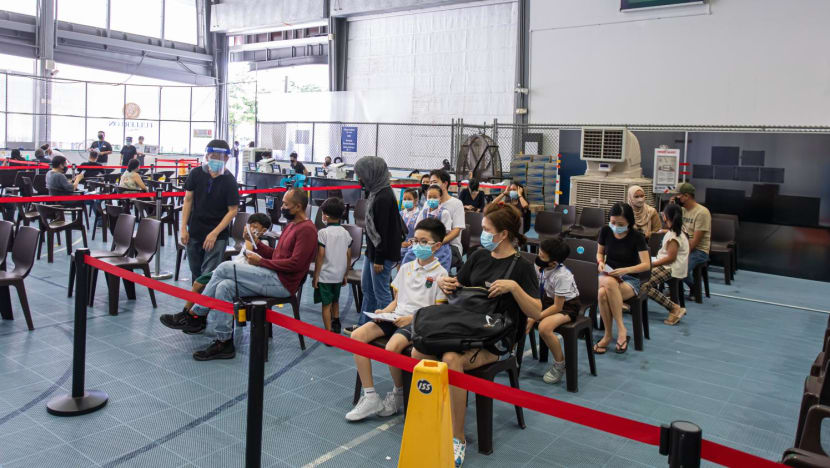No reports of serious adverse events in children aged 5 to 11 after COVID-19 vaccine: HSA

Families with children prepare to receive their COVID-19 vaccination at Our Tampines Hub vaccination centre. (Photo: MSF)
SINGAPORE: No serious adverse events have been reported in children aged five to 11 who have taken their COVID-19 vaccine as of end-December last year, said the Health Sciences Authority (HSA) on Wednesday (Jan 19).
The COVID-19 vaccination programme was rolled out to children aged five to 11 on Dec 27.
Six reports of “non-serious” reactions to the Pfizer-BioNTech/Comirnaty vaccine - the only vaccine approved for this age group - were lodged, representing 0.03 per cent of the 20,327 doses that were administered.
Of the six cases, three were allergic reactions such as hives and swelling of the eyelids, face and lips, while there was one report each of dizziness, fever and fast breathing, HSA said in a safety update.
This is the ninth such COVID-19 vaccine safety update, covering the period since the roll-out of the national programme on Dec 30, 2020 to Dec 31, 2021.
As for children aged 12 and above, HSA said it received 1,170 reports of adverse reactions, representing 0.18 per cent of the 663,239 doses administered. Vaccinations for this age group started on Jun 3.
Of these, 83 were serious adverse events including allergic reactions, skin conditions, seizures, dizziness, syncope (fainting and brief episode of loss of consciousness), myocarditis, pericarditis and tachycardia, HSA said.
OVERALL MRNA FIGURES
More than 11.4 million doses of the Pfizer and Moderna/Spikevax vaccines have been administered as of end-December last year, out of which 14,729 suspected adverse events were reported, or 0.13 per cent.
The most commonly reported adverse events were consistent with those typically observed following vaccination, said HSA. They include allergic reactions, dizziness, shortness of breath, chest tightness or discomfort, palpitations, as well as injection site reactions.
"These typically resolve within a few days," HSA added.
A total of 747 reports were classified as serious adverse events, accounting for 0.007 per cent of all administered doses. The most frequently reported serious adverse events were anaphylaxis (87 reports) and other severe allergic reactions (53 reports). Other cases included immunological, cardiovascular, renal and respiratory issues.
ADVERSE REACTIONS TO BOOSTER SHOTS
For individuals who took their booster shots, there were 49 reports of serious adverse reactions, or 0.002 per cent of the 2.2 million doses administered. The booster programme was rolled out on Sep 15.
Of these, 10 were cases of myocarditis and pericarditis, caused by inflammation of the heart muscles and outer lining of the heart, respectively.
All 10 cases occurred after taking the Pfizer vaccine, HSA noted.
But “it should be noted that a higher proportion of individuals (about 70 per cent) received this vaccine as their booster dose”, HSA said.
The authority added that it would “closely monitor the adverse events and will inform the public on any significant events and take relevant regulatory actions as required”.
The HSA also received 401 reports of non-serious adverse reports associated with the Pfizer vaccine and 172 reports linked to the Moderna vaccine as booster doses.
Related:
OTHER COVID-19 VACCINES
Following the administration of 332,379 doses of the Sinovac-CoronaVac vaccine, 271 suspected adverse events (0.08 per cent) including 20 serious ones (0.007 per cent) were reported.
Thirty-five suspected adverse events (0.05 per cent), including four serious adverse events (0.005 per cent), were reported after 75,440 Sinopharm vaccine doses were administered.
“It should be noted that the type and number of reports received for different COVID-19 vaccines are not directly comparable as the vaccines have been used in the vaccination programme for different durations of time,” HSA said.
“The inactivated COVID-19 vaccines have been administered only to a very small proportion (3.5 per cent) of the population compared to the much larger scale of deployment for the mRNA vaccines,” it added.
Vaccination for the Sinovac-CoronaVac shot started on Jun 18, while the rollout of the Sinopharm vaccine began around two months later on Aug 30.
“HSA will continue to closely monitor the safety profile of the COVID-19 vaccines and relevant regulatory actions will be taken to safeguard public health,” the authority said.
BOOKMARK THIS: Our comprehensive coverage of the COVID-19 pandemic and its developments
Download our app or subscribe to our Telegram channel for the latest updates on the coronavirus pandemic: https://cna.asia/telegram

















